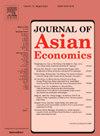俄罗斯化石燃料贸易平衡中的j曲线现象:傅里叶- ardl分析
IF 3.4
3区 经济学
Q1 ECONOMICS
引用次数: 0
摘要
俄罗斯化石燃料贸易的持续失衡,引发了有关宏观经济因素(尤其是汇率动态)在塑造能源贸易结果中的作用的重要问题。尽管j曲线的理论主张,具体到化石燃料的实物贸易平衡的经验证据仍然有限。本研究以国内生产总值、可再生能源消费和贸易开放度为控制变量,考察了1994年至2024年实际汇率变动对俄罗斯化石燃料实物贸易差额的短期和长期影响。采用傅立叶自回归分布滞后(FARDL)方法,结果证实了j曲线效应的存在,即货币贬值首先恶化,但随后改善了化石燃料的实物贸易平衡。此外,经济增长显著加剧了化石燃料贸易逆差,而可再生能源消费在短期内减少了这种不平衡。研究发现,贸易开放具有积极的短期影响,但其长期影响在统计上不显著。该研究提出了政策建议,以管理汇率灵活性,加速可再生能源转型,并协调贸易和能源政策,以实现更具弹性和可持续的能源贸易平衡。研究结果为宏观经济基本面与能源贸易动态之间复杂的相互联系提供了新的见解。本文章由计算机程序翻译,如有差异,请以英文原文为准。
The J-curve phenomenon in Türkiye’s fossil fuel trade balance: A fourier-ARDL analysis
The persistent imbalance in Türkiye's fossil fuel trade raises important questions about the role of macroeconomic factors, particularly exchange rate dynamics, in shaping energy trade outcomes. Despite theoretical assertions of the J-curve, empirical evidence specific to the physical trade balance of fossil fuels remains limited. This study investigates the short- and long-run effects of real exchange rate movements on Türkiye's physical trade balance for fossil fuels from 1994 to 2024, incorporating gross domestic product, renewable energy consumption, and trade openness as control variables. Employing the Fourier Autoregressive Distributed Lag (FARDL) approach, the results confirm the existence of a J-curve effect, whereby currency depreciation at first worsens but subsequently improves the physical trade balance for fossil fuels. Additionally, economic growth significantly exacerbates fossil fuel trade deficits, while renewable energy consumption reduces the imbalance in the short run. Trade openness is found to have a positive short-run impact, although its long-run effect is statistically insignificant. The study proposes policy recommendations to manage exchange rate flexibility, accelerate renewable energy transitions, and align trade and energy policies to achieve a more resilient and sustainable energy trade balance for Türkiye. The results offer fresh insights into the complex interlinkages between macroeconomic fundamentals and energy trade dynamics.
求助全文
通过发布文献求助,成功后即可免费获取论文全文。
去求助
来源期刊

Journal of Asian Economics
ECONOMICS-
CiteScore
4.70
自引率
9.40%
发文量
90
期刊介绍:
The Journal of Asian Economics provides a forum for publication of increasingly growing research in Asian economic studies and a unique forum for continental Asian economic studies with focus on (i) special studies in adaptive innovation paradigms in Asian economic regimes, (ii) studies relative to unique dimensions of Asian economic development paradigm, as they are investigated by researchers, (iii) comparative studies of development paradigms in other developing continents, Latin America and Africa, (iv) the emerging new pattern of comparative advantages between Asian countries and the United States and North America.
 求助内容:
求助内容: 应助结果提醒方式:
应助结果提醒方式:


